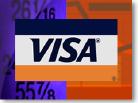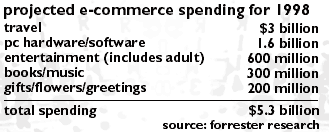|
Visa sees a Smarter way
|
 |
September 28, 1998: 12:34 p.m. ET
Credit card group bets on Smart cards, but isn't satisfied with test marketing
|
NEW YORK (CNNfn) - As virtual commerce becomes more of a reality for consumers, Visa International is pushing what it thinks will be the next wave of shopping technology.
The San Francisco-based credit card association wants its member banks to distribute so-called "smart cards" -- multifunctional cards with an embedded computer chip that allow the holder to debit funds that are stored onto the card or in a checking or savings account.
But Visa's vision of the next-generation of e-commerce -- which it terms "Smart commerce" -- already has been met with much criticism. In Manhattan's Upper West Side neighborhood, the nation's largest bank, Chase Manhattan Corp., launched a test-marketing campaign with Smart cards. So far, bank officials will only describe the program as a "learning" experience.
And in his first public appearance as the newly elected president and chief executive of Visa, Malcolm Williamson explained that he wasn't satisfied with how Visa's message is coming across.
"I think the trouble is, in many cases at the moment, we've got so many experiments going on, people are losing sight of the ultimate potential," Williamson said during an interview with CNNfn.
Visa's concern is certainly understood given what is at stake. Based on its own projections, online transactions worldwide are estimated to reach $15.3 billion in 1998 and in excess of $100 billion in four years, according to a study released last week.
And those projections represents a fairly conservative outlook compared with surveys from independent research outlets. International Data Corp. (IDC) of Framingham, Mass., projected the e-commerce market to grow to $426 billion by 2002.
In the U.S. alone, the market is estimated to more than double next year from the $2.5 billion in transactions recorded in 1997, according to Forrester Research Inc. of Cambridge, Mass.

Growth still depends greatly on the ability to overcome lingering concerns about security. In an effort to allay such fears, Visa and MasterCard International Inc. jointly created the Secure Electronic Transaction standard last December.
"I think at this level, it's probably as secure as (traditional commerce). I think people's fears are quieting. Transacting is becoming easier and more secure all the time," said Paris Burstyn, analyst at IDC.
Indeed, Smart cards can fuel further growth. And by helping to eliminate the labor-intensive tasks of auditing and receipt collection, Smart cards will definitely simplify back-end operations between merchants and Visa's member banks. But analysts have also raised questions about the advantages of Smart commerce for the consumer.
"As is very often the case, the smart card is a solution designed more for the benefit of the financial institution than it is for the consumer," said James McQuivey, analyst at Forrester.
But Williamson hopes consumers will consider the following scenario:
At a local mall, an angst-ridden teenager approaches a shopping kiosk to purchase a copy of Nirvana's "Nevermind" CD -- a right of passage for all teens. Yet, instead of using a conventional credit card, the shopper inserts a chip-embedded Smart card.
The imaginary scenario is actually a part of everyday life in Singapore for some cardholders of Standard Chartered Plc, the U.K.-based financial institution that Williamson headed prior to his appointment at Visa in June.
"This is where one is trying to get to. And the trouble is, in a lot of the experiments, the consumer is not understanding where this thing might lead," Williamson said.
By his own admission, the chief executive acknowledges the Chase Manhattan/Visa marketing test, conducted with Citicorp and MasterCard, was too limited -- focusing only on stored-value cards. About 450 merchants participate in the program, which is still on-going.
The Smart cards that he helped introduce in Singapore -- which operates on an open Java-compatible standard -- is a multifunctional card that "really offers the consumer a multiple choice.
"That's giving the consumer a huge amount of flexibility," he said.
-- by staff writer Robert Liu
|
|
|
|
|
 |

|

